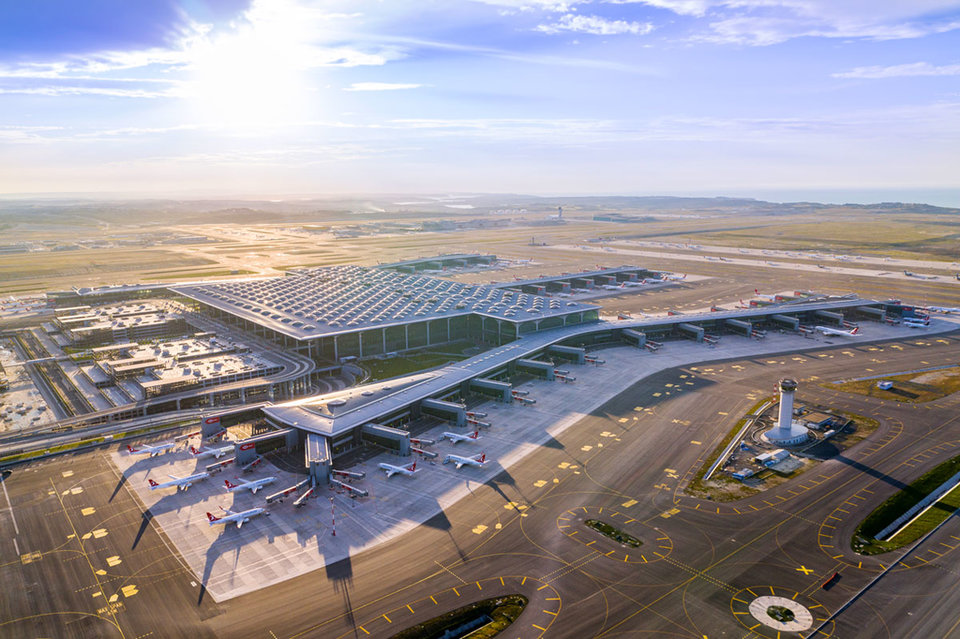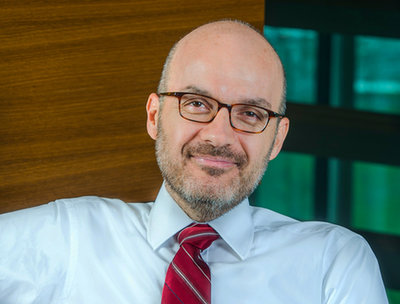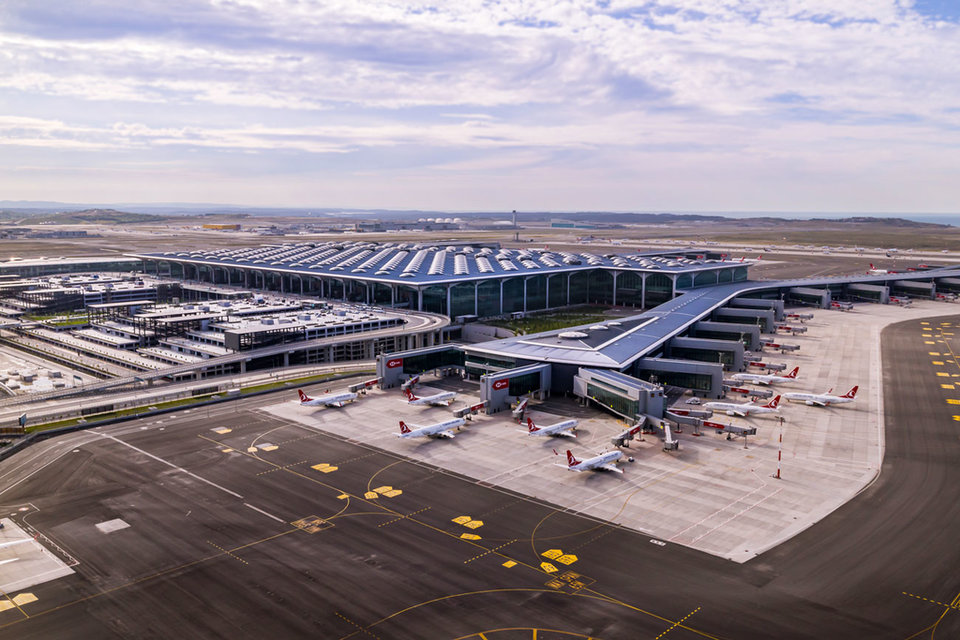SAFETY
Istanbul Airport:
leading the charge against Covid-19
Istanbul Airport recently became the first airport in the world to be accredited under Airport Council International’s Airport Health Accreditation Scheme. As the airport’s CEO Kadri Samsunlu explains to Adele Berti, the scheme is playing a crucial role in Istanbul’s bid to attract passengers back to flying.
When the coronavirus crisis hit Europe in March, Istanbul Airport was yet to celebrate its second birthday. After handling 200,000 passengers per day in its first year, the hub’s pristine new terminal, lively lounges and cutting-edge technologies were observed primarily by passengers coming off a handful of daily repatriation flights for two long months.
“I have to admit, it's a very big pity to be hit by this pandemic less than two years after opening a big greenfield infrastructure project,” says Istanbul Airport CEO Kadri Samsunlu. “It was a heart-breaking period and a very tough situation, especially for a company that had just come out of a huge capex programme.”

Many countries are now facing new national lockdowns that could put the already fragile state of airports at risk again, but this time Istanbul Airport is making sure it is prepared for what’s coming. In practical terms, this has meant moving quickly to enrol in Airport Council International’s (ACI) Airport Health Accreditation Scheme, which assesses how aviation hubs are protecting passengers and staff from transmission through cleaning, social distancing and communications initiatives.
The first airport in the world to obtain this accreditation, Istanbul Airport wants to make its Covid-19 prevention measures the pillar of its bid to invite tourists back into the country and return to pre-pandemic levels.
All images: Istanbul Airport
Tackling Covid-19 with the Health Accreditation Scheme
“In the past, the sector went through similar health crises like with SARS and several other epidemics, creating temporary volatility in its volumes, but Covid-19 resembles nothing of what we've experienced in the past,” says Samsunlu. “There is a huge fear factor embedded in this crisis and the users of airport transportation facilities need to feel comfortable when they're back travelling.”
This is the starting point for the Airport Health Accreditation Scheme, which is based on guidance from the International Civil Aviation Organisation (ICAO) and features a rigorous set of requirements for airports to comply with. These include handling and sanitising of escalators and bridges, cleaning, disinfection, social distancing measures, protection of personnel, passenger communications, access to the terminal, and more.
Istanbul Airport CEO Kadri Samsunlu

Fulfilling all these categories involved implementing upgrades on pre-existing facilities and new measures and rules for the Turkish hub. “The airport itself is a very big structure,” explains Samsunlu. “We already had a very large space to allow social distancing to the extent that, even without any new social distancing measure, on a normal day last year people had really low chances of getting close to each other or creating a hotspot.”
Other measures, such as compulsory masks, temperature screenings and introducing new air cleaners that provide 100% fresh air, were all a result of Covid-19. “Before the pandemic, we didn't really worry much about the psychological support for our staff,” he adds. “This is crucial now because there are a lot of people struggling with being locked at home.
This is the starting point for the Airport Health Accreditation Scheme, which is based on guidance from the International Civil Aviation Organisation (ICAO) and features a rigorous set of requirements for airports to comply with. These include cleaning, disinfection, social distancing measures, protection of personnel, passenger communications, access to the terminal, handling and sanitising of escalators and bridges, and more.
“We also used to have a lot of face-to-face training programmes and now we shifted to online training.”

We already had a very large space to allow social distancing
Expectations of recovery for Istanbul Airport
Since its launch earlier this summer, numerous airports have joined Istanbul in receiving ACI’s accreditation in the hope of re-establishing some much-needed passenger confidence in flying, which is the programme’s ultimate goal. “What this accreditation means is that the mindset of the airport management is to protect the health of passengers and employees, as well as provide enough safety in a well-established way,” says Samsunlu.
Yet despite these positive initiatives and a welcome return of domestic flights due to the easing of lockdowns, the hub has not yet recovered. Much like the rest of the world, coronavirus has taken its toll on Istanbul Airport.

Since June, the airport has been handling some 500 flights and 60,000-70,000 passengers per day, which is almost a third of the number recorded this time last year. “All [European airports] are currently making 25%-40% of 2019 [passenger] volumes,” comments Samsunlu.
With 2019 levels remaining the benchmark in terms of growth, the future of aviation is strictly tied to several factors, such as the development and rollout of a vaccine, as well as the commercialisation of rapid on-site testing and its introduction as a replacement of quarantine rules worldwide.
“Now, we have between 30% and 35% of last year's volumes,” Samsunlu comments. He hopes that the hub will hit 50% of 2019 volumes by the end of the year and fully recover by the end of 2021, but believes this can only happen if the above conditions - together with thorough handling of any future wave - eventually materialise.
The future of aviation is strictly tied to several factors
Forward vision: big data and in-airport delivery
More can be done to accelerate passengers’ return and Samsunlu believes that many solutions are already available. “Contactless solutions are something we've already introduced in our operations but passengers will feel even safer if there are more contactless processes at the airport,” he says. “We have been in very close discussion with the government to let us have access to biometric gates and passenger data.
“Once we do that, we can use pictures taken at the airport, run them with the government database and then start contactless passenger flow at airport touchpoints, including check-ins, passport control, shopping and boarding.”

Big data is an area that needs strong reinforcement in the face of the pandemic, he adds. “Big data [is needed] when managing information among airports, airlines and governments. If a passenger has had any contact with positive people from its origin country prior to flying, then all airports must have access to this information.”
While lobbying to have broader access to passenger information, the hub is also launching new sensor-based solutions to track passengers and avoid large gatherings inside its terminal.
Lastly, Istanbul Airport is currently working on a new e-commerce platform that will allow passengers to buy products online and then have them delivered by staff at the terminal. “We need to introduce product solutions that will give passengers more control of their journeys so they will be less dependent on us while they are at the airport,” Samsunlu concludes.
Big data [is needed] when managing information among airports, airlines and governments